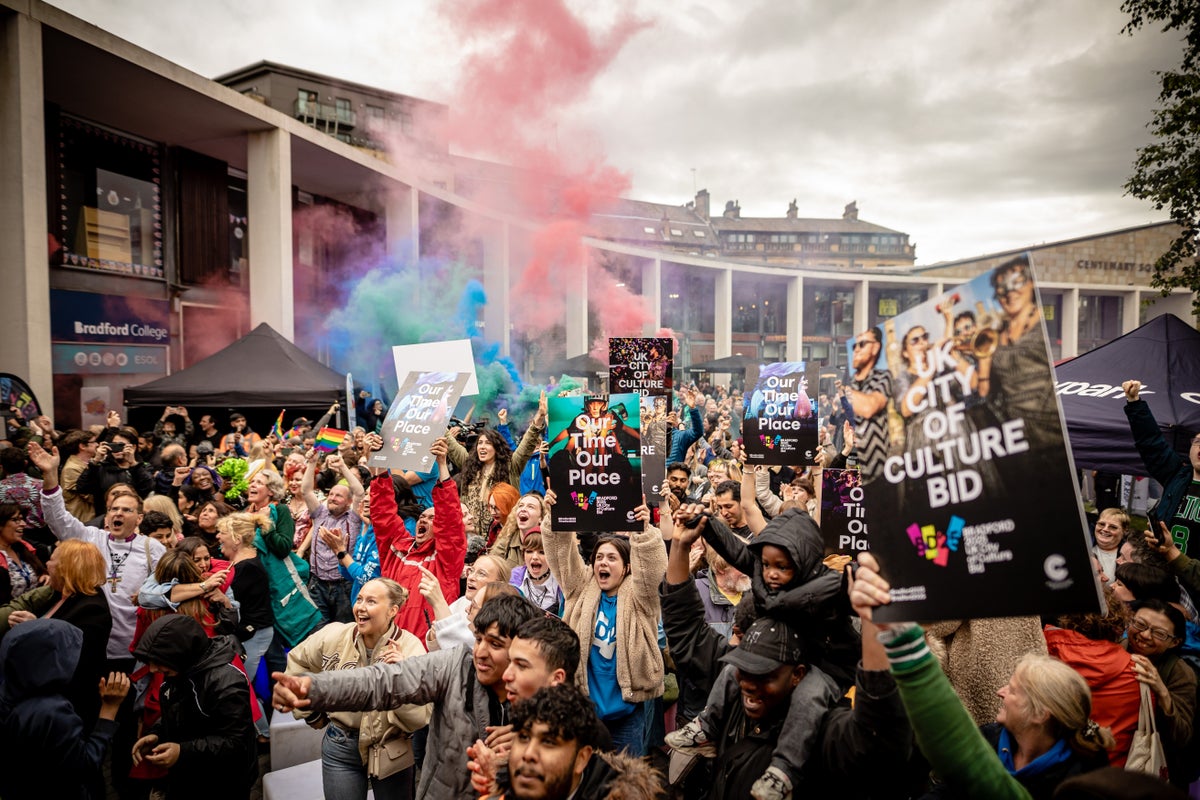
Cash-strapped councils splashed millions of pounds on failed bids to be the UK’s next City of Culture, new figures show.
Bradford was announced as the winning candidate last summer after promising to stage 1,000 events for the 2025 jamboree.
But 15 local authorities – several in financially perilous situations – spent more than £4m trying to persuade the government they should host the year-long festival, The Independent can reveal.
The astonishing sums have been revealed as another local authority, Birmingham City Council, effectively declared itself bankrupt this week, while 26 other councils across the UK are also said to be at similar risk of economic collapse.
Among those who failed to win City of Culture 2025 were Southampton, which lavished £1.59m on a bid before declaring itself at risk of “financial failure” this summer, and Durham which burned through £345,000, even though it has since warned it will run out of money unless it can save £52m in the next four years.
A light projection at The Bargate in Southampton, as part of the city’s bid to become the UK City of Culture 2025— (PA Wire)
Other big spenders included Wrexham Council (£305,000), Armagh City, Banbridge and Craigavon Borough Council (£227,352), and Medway Council (£190,000). Bradford itself splashed out £1.16m on its own bid.
Critics are now questioning how the huge outlays on City of Culture bids could ever have been justified in an era of such hardship.
Both local residents and national cultural campaigners say the money – which covered marketing materials, hosting judge visits and consultancy fees – would have been better spent either securing reserves or, at least, on improving core services such as road maintenance and library provisions.
Laura Swaffield, chair of the nationwide Library Campaign group, said: “What this is, is councils trying to win something big and shiny and which makes good headlines but which, ultimately, has very little benefit for the vast majority of people – certainly those in all the areas that did not even win.
“The fact this comes when most councils across the UK have spent years slashing the budgets of institutions like libraries and museums – the very backbone of culture – is especially galling.
“If you had given even a fraction of this money to good libraries – which operate on shoestring budgets – it would be transformative and of long-term benefit to local people in a way that I’m just not sure being City of Culture can be.”
In Bradford’s case, the £1.16m was spent despite the fact the council’s reserves are – according to a report published in July – now “close to exhaustion”. The 2023-24 budget is set to have a £50m overspend.
Brendan Stubbs, leader of the Lib Dem group on the Labour-run council, said: “We have a children’s services that has effectively been in special measures for four years and a social care system that is buckling under pressure, so I think it is very difficult to justify this.
“Having won, I’m sure there will be benefits but the other side of that argument is we will now spend even more on delivering the thing at a time when we are having to dip into our reserves just to cover the basics.
“This is not how well-led institutions work. Economically, it is illiterate. You do the boring, fundamental stuff well and then you can think about the extras.”
Yet proponents insist the money was a good investment.
In Bradford the official line is that being City of Culture will lead to an estimated £700m worth of private and public investment in both the cultural sector and public realm regeneration, while also creating up to 7,000 jobs.
Supporters of Bradford’s successful bid – which cost £1.16m – say it will help to create thousands of jobs— (PA Media)
The suggestion is that the festival will boost both civic pride and visitor numbers to one of the UK’s poorest cities, while also enabling it to attract extra funding from bodies such as Arts Council England and the National Lottery Heritage Fund.
A spokesperson for the council said: “City of Culture will bring a much welcome boost to our local economy, not just through the programme itself, but also the lasting positive impact it will have on businesses through increased visitors to Bradford District.”
Unsuccessful councils, meanwhile, say the bidding process has resulted in an enhanced national profile and generated significant local interest in cultural projects.
A spokesperson for Wrexham Council said: “The City of Culture bid was one of the biggest cultural events that has ever taken place in Wrexham, bringing communities of all types together in their shared love of Wrexham culture. The national exposure showcased Wrexham to the UK and the publicity alone was worth far in excess of the expenditure of the bid.”
A carnival on the streets of Coventry marking the closing weekend of its year as UK City of Culture in 2021— (PA Wire)
Neither Southampton Council nor Durham Council responded to request for comment.
The Department for Digital, Culture, Media and Sport, which runs the competition, said Bradford would now receive £275,000 in seed funding from the government while the shortlisted candidates – Durham, Southampton and Wrexham – would receive £125,000 to spend on cultural projects.
Previous winners of the title have been Derry in 2013, Hull in 2017 and Coventry in 2021, with research offering a decidedly mixed picture as to the extent of the long-term benefits for each place.







